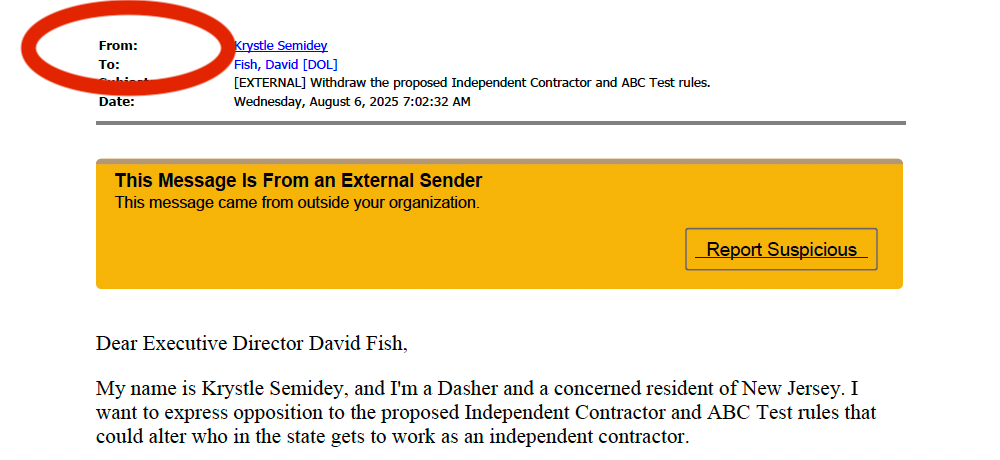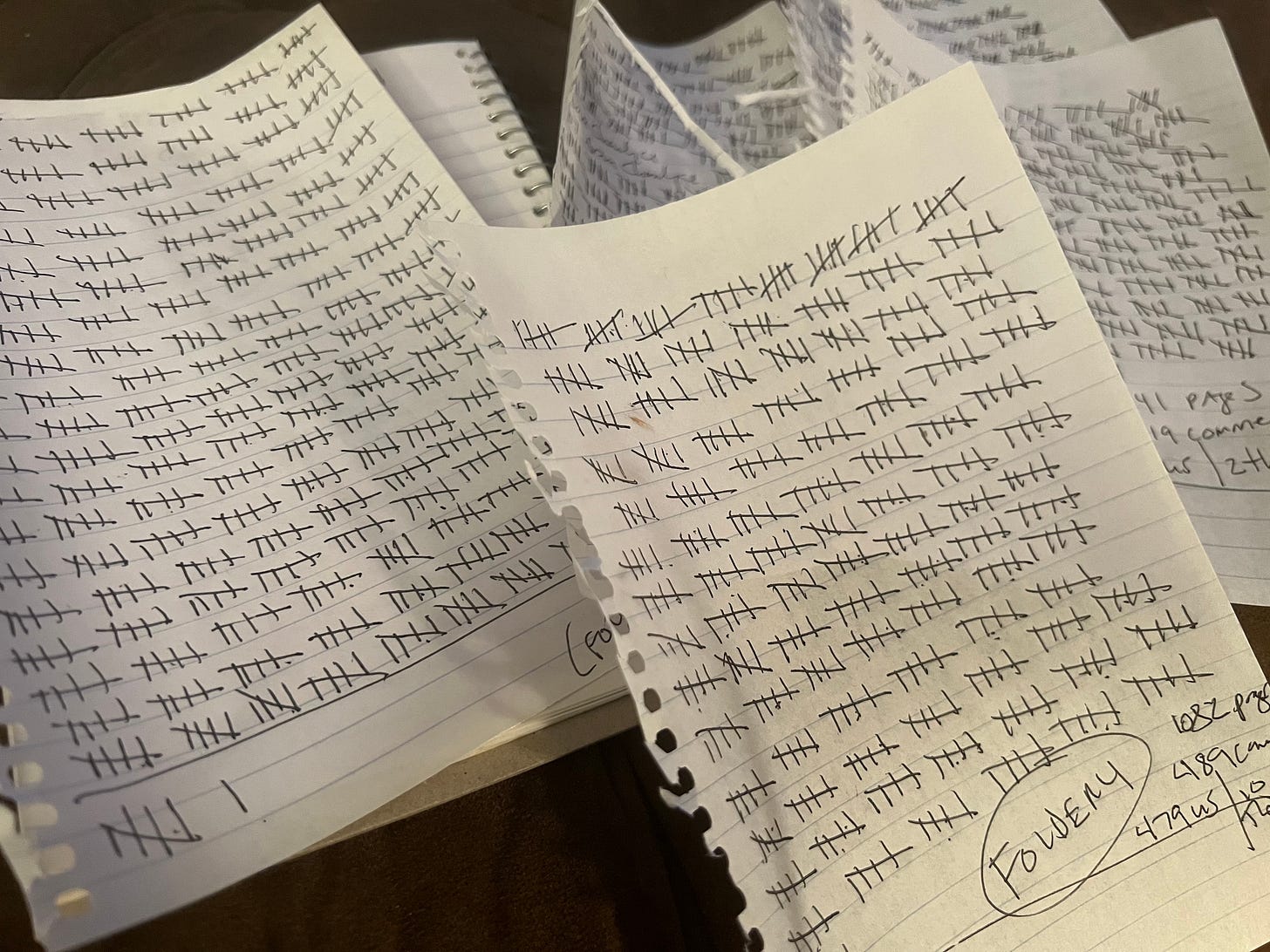It's 99% Opposed in New Jersey
Among about 8,300 written public comments, only about two dozen support the Labor Department's proposed independent-contractor rule.
The New Jersey Department of Labor & Workforce Development made it an Olympic-grade challenge to get an accurate count of the public comments submitted about its proposed independent-contractor rule. Unlike with a federal rule proposal, where the government keeps a running tally so you know exactly how many public comments have been received, and you can easily search, sort and count them in a database, New Jersey’s Labor Department instead uploaded 11,688 pages of public comments in PDF format.
Specifically, the Labor Department uploaded five gigantic PDFs, with each of the five PDFs being a combined hundreds or thousands of individual public comments.
Here’s a 14-second video clip of me scrolling through a few pages within PDF number five (which is 6,261 pages long) so you can see what I mean:
Obviously, this format is not ideal for counting or analysis. Which is why the figures you’re about to read are taken from a combination of counts done not just by me, but also by numerous other people working manually and with AI tools.
First, I tried to determine how many public comments there actually are within the five gigantic PDFs that, combined, total 11,688 pages. I searched each of the five PDFs for “From:” because in the header of every email the Labor Department received, the sender’s email address is listed next to “From:”
That search gave me a count of 8,292 emails that the Labor Department received. Some friends of mine using two different AI programs did multiple searches and also came up with a range of about 7,800 to 8,200 comments.
Just to be sure we weren’t missing anything, I also did a manual count where I looked at every page and tallied the total number of comments by hand. That count yielded a total of 8,679 public comments filed.
Based on an average all of those counts, I went with an estimated 8,300 written public comments in total. I did not include the handful of letters in the PDFs from legislators expressing concern, because numerous legislator letters I’m aware of were missing. You can see all the legislator letters I’m aware of here. Add two to that list that were in the public comments: Democrats Paul Sarlo and Benjie Wimberly, both requesting exemptions for financial professionals.
Then, I set out to determine the percentages of support and opposition. On my first pass scrolling through all the PDFs, the big-picture ratio was clear and overwhelming opposition to the proposed rule. The vast majority of comments either asked for the rule to be withdrawn entirely, or requested a professional exemption from it. I felt like I was at some kind of stadium-style rally of independent contractors.
I did two more full scrolls through the PDFs looking for comments that support the proposed rule. I also did keyword searches for terms like “AFL-CIO” and “Teamsters” that were likely to have filed comments in support. I compared my notes with the folks using AI to search, and I made a combined master list of all the comments in support that everyone had found.
The results were so lopsided with opposition that I also did another set of keyword searches for “support” and “favor,” trying to ferret out any supportive comments we may have missed. I mostly found por favor from Spanish-speaking DoorDash drivers who oppose the rule-making.
Finally, I emailed the New Jersey Labor Department to make sure that what is in these PDFs is, indeed, all the comments that exist. I thought maybe more comments were yet to be released, and that perhaps additional comments of support would be there. But the Labor Department replied that this is, indeed, all the comments that exist.
So, I am confident that what I’m about to tell you would pass muster in a court of law where the goal is to get things right beyond a reasonable doubt. Might this be off by a small number of comments? Yes. But the results are such a tsunami of opposition, it would not make a material difference.
Here are the findings:
New Jersey’s Labor Department released 11,688 total pages of written comments
A reasonable estimate is about 8,300 total written public comments filed
26 written comments (less than 1%) are in support of the proposed rule
Those 26 supportive written comments were filed by 18 organizations and eight individuals
16 of the 18 organizations that filed supportive written comments were unions or had strong affiliations to unions
The 8 supportive individual comments were from:
a rideshare driver
a former rideshare driver
a person who works in insurance compliance and as an app-based courier
a financial planner
four people whose occupations are not stated
I fully understand how incredible these findings appear to be, but it is fair to say that 99% of all written public comments are opposed to New Jersey’s proposed independent-contractor rule.
The 26 Written Comments in Support
At the public hearing in June, the only witnesses who testified in support of the proposed rule were either employed by unions, or affiliated with organizations that have strong union ties. You can see their 12 names and affiliations here.
Below are the 26 written public comments in support of the proposed rule.
New Jersey State AFL-CIO
The New Jersey State AFL-CIO’s legislative director, Eric Richard, testified in support of the proposed rule at the public hearing in June.
Amalgamated Transit Union
Demos
Demos describes itself as a racial-justice think tank with locations in New York City and Washington, D.C. According to its 2024 annual report, its funding comes from numerous sources including the Ford Foundation, the John D. and Catherine T. MacArthur Foundation and the Robert Wood Johnson Foundation. According to InfluenceWatch, Demos “receives substantial funding from labor unions and progressive foundations.”
Economic Policy Institute
The Economic Policy Institute, whose chairwoman is AFL-CIO President Liz Shuler, posted its public comment online here. You can read what I wrote about this comment here.
Engineers Labor-Employer Cooperative
Coalition for Healthy Ports NY/NJ
The coalition for Healthy Ports NY/NJ represents more than 50 environmental, labor, faith, community, environmental justice and business organizations led by Clean Water Action, Ironbound Community Corporation, New Jersey Environmental Justice Alliance, South Ward Environmental Alliance – Teamsters Local 469, and Earthjustice.
Human Rights Watch
Human Rights Watch regularly criticizes the gig economy for, among other things, creating “barriers to unionizing.” Human Rights Watch posted its public comment online here. You can read what I wrote about this comment here.
International Union of Painters & Allied Trades
New Jersey Association for Justice
This is an employee-side professional association.
New Jersey State Building & Construction Trades Council
Legal Services of New Jersey
This organization coordinates legal services for low-income residents.
Make the Road New Jersey
Joseph Niver of Make the Road New Jersey testified in support of the proposed rule at the public hearing in June. This group’s staff is organized with the United Auto Workers Union 2320. Several pages of this public comment are letters from individuals described as “workers affiliated with Make the Road New Jersey.” Those individuals are an upholstery worker and two Amazon Flex drivers. One individual’s occupation is not identified.
National Employment Law Project
Maya Pinto of the National Employment Law Project testified in support of the proposed rule at the public hearing in June. Prior to joining NELP, Pinto worked with the Service Employees International Union. Employees of NELP are organized with United Auto Workers Local 2320.
Public Justice Center
This is a legal aid office based in Baltimore, Maryland. According to its 2024 annual report, its many partners include 1199SEIU, the Maryland State and D.C. AFL-CIO, the Mid-Atlantic Regional Council of Carpenters, the National Employment Law Project, SEIU 328J and Unite Here! Local 7.
Teamsters Local No. 469 and Teamsters Joint Council 73
United Food & Commercial Workers International Union
Workplace Justice Lab (Jake Barnes)
The Workplace Justice Lab is at the Rutgers University School of Management and Labor Relations. Its home page describes its “Build the Base, Grow the Movement” program as attempting to build power for worker centers, unions, worker associations and community organizations. Jake Barnes also testified in support of the proposed rule at the public hearing in June. His written public comment includes several corrections to that spoken testimony.
Workplace Justice Lab (general)
See entry No. 17 for a description of the Workplace Justice Lab.
Charles Adams, unknown occupation
Dwight Baker, rideshare driver
Jon Fulford, insurance compliance and app-based courier
Josh Clarke, unknown occupation, cites Uber Eats and DoorDash
Individual with redacted name, financial planner
Bill Feeney, occupation unknown, cites Human Rights Watch
Brian McFarland, occupation unknown, cites Uber and Lyft
Chavin Haines, former rideshare driver, cites Human Rights Watch
If anyone finds additional comments of support in the PDFs, please send them to me and I will update this article.
There would need to be about 80 comments like these to reach even 1% support for New Jersey’s proposed independent-contractor rule.




